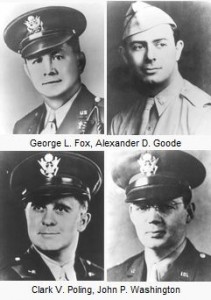MAAF attends chaplains history event
On 16 February, the Veteran’s History project and Interfaith Alliance hosted a discussion among five military chaplains. The panel was diverse, including three Christian denominations, Judaism, and Islam. Dr Gaddy of Interfaith Alliance asked questions about the chaplains’ motivation for their service, the implications of gays in the military, proselytism in uniform, support for nontheists in the military, and the Army’s spiritual fitness training programs.
Chaplains provided inspiring commentary on their background and commitment to service members. They provided conflicting commentary on support of nontheists. In response to a question by Dr Gaddy, chaplains all said they have and would provide support for nontheists. Chaplains talked about “provide and provide for” which is to say that Christian chaplains may not be able to provide Jewish worship services, but they can provide prayer books, Torahs, and references to local Synagogues. MAAF is preparing and presenting pamphlets, readers, references to local organizations, and a supportive community so that chaplains can provide not just support, but support equivalent to other groups. As MAAF reaches out to provide the resources chaplains need, I hope the chaplains will accept the help and make these resources available.
During the event, Dr Gaddy presented a scenario in which a soldier lie dying on the battlefield. Dr Gaddy asked if the chaplain should ask that soldier about hell or introduce the soldier to Jesus. Navy Captain Lea (Christian), Army Lt Colonel Birch (Christian), and former Army Captain Seidler (Jewish) fielded the questions. Chaplain Birch clearly indicated that he would proselytize the dying soldier. He stated, “My job is to bring soldiers to god and god to soldiers … I don’t do it as a salesperson.” I can confirm that nontheists facing death do not need the extra stress of proselytism, and there is no room for military officers to use their position to promote their faith. Captain Lea, a 30-year veteran and senior Navy chaplain, state “there really is no wrong answer.” To the contrary, proselytism is the wrong answer, and chaplain leaders must enforce boundaries in sharing faith. Rabbi Seidler, I’m sure imagining himself in that situation, objected to the idea of proselytism, saying, ” I wouldn’t use theistic language [if I knew the soldier was nontheistic] because that would actually get in the way of the relationship.”
The event itself was very inspiring, beginning with a re-telling of the story of the “four chaplains,” who gave their counsel, their life jackets, and their lives to save others in the WWII sinking of the troop ship USAT Dorchester. The joined hands, sang hymns, and went down with the ship. Chaplain Birch told the story of his decision to be a chaplain. He was a field artillery chaplain in Germany. For lack of a chaplain, he led the unit in prayer after a training death. To help ensure soldiers had chaplains to turn to, he became a chaplain himself. Chaplain Saif, the second Muslim chaplain in the Navy, talked about his successes and support of all service members despite the fact that the vast majority do not share his faith. The dedication to service members came through from every chaplain. With some additional resources for nontheists and understanding of the dangers of proselytism, chaplains can serve everyone better. MAAF will continue to reach out to these and other chaplains to expand and improve chaplaincy services.
Chaplains speaking
- Capt. Jerry Seidler, Rabbi, Army Reserves
- Capt. John H. Lea III, Force Chaplain, Navy Installations Command, Washington, D.C.
- Lt. Col. Lisa H. Tice, Staff Chaplain, Personnel, Budget, and Readiness Division, Office of the Chief of Chaplains, Bolling Air Force Base, Washington, D.C.
- Lt. Cmdr. Abuhena Saifulislam, Chaplain, U.S. Marine Corps and Navy Chaplains Corps
- Lt. Col. Carleton Birch, Chaplain, Army Office of the Chief of Chaplains

